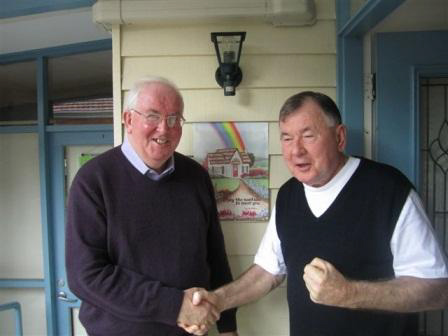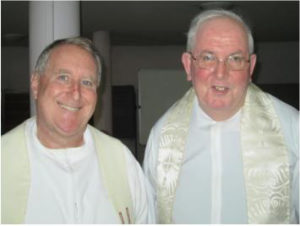
Fr Tom McDonough and Fr Pat Munroe
On the weekend (31st May – 2nd June) I was in Melbourne for the annual Australian Directors Gathering of the Passionist Family Group Movement (PPFM) by kind invitation of the Provincial Fr. Tom McDonough CP. Whatever misgivings I may have had in accepting the invitation to travel such a great distance and spend a weekend with people I had never met, they soon dissipated with the warmth of welcome I received. It was in keeping with the Motto of the Movement, a ‘Family for All.’
What attracted me to the Movement, and still does, is its grass roots approach in the ordinariness of life, and with a little imagination I believe it can work in our parishes. The aims are very simple, for people to get to know each other as members of the Parish, to support each other, sharing joys and sorrows, building the Christian community, as in the early Church. “Love one another as I have loved you.”
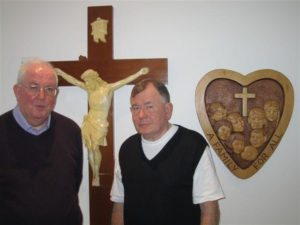
Fr Pat Munroe and Fr Peter McGrath
Fr. Peter McGrath, Passionist Priest, formed the first Family Groups in the small parish of Terrey Hills on the outskirts of Sydney in 1972. It grew out of the realisation that people who came together as a community at Mass did not know one another. From small beginnings the spread of the Movement around Australia began in 1985. The Movement is present in over 400 parishes in 20 Australian Dioceses, including Parishes in Anglican Dioceses. Family Groups began in New Zealand in 1988 and are in more than 80 parishes in all 6 Dioceses, including Baptist, Anglican and Presbyterian Parishes. They are in early stages in England, Ireland, and the United States.
Family Groups – Social or Religious?
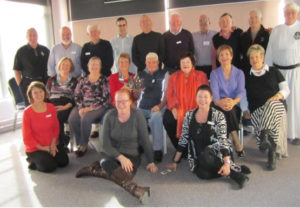
Australian Family Group Directors
Jesus would have found this a strange distinction, but some people still ask the question. When we lean to accept others who are different from us, and when we offer welcome, love, and care and enjoy doing it, then God is there right in the middle of it. Faith is caught in as much as it is taught, and there is a lot of “faith catching” in Family groups. They are one way that we can build up the spirit of community in our Parish.
Down to earth spirituality
St. Paul of the Cross (1694-1775) is Founder of the Passionist Order. Paul speaks of the Passion of Jesus as “the most overwhelming sign of God’s love.” The two dominant Scripture texts) he used in writing his rule are Philippians 2:5-11 (self-emptying of Jesus) and Mark 6:7-13, (Mission of the twelve) that the disciples were to go out in two’s as Jesus did. The key to Passionist spirituality is to ‘promote the ‘living memory of the passion’ with a special emphasis on being down to earth. The logo of the Passionist Order is that of the Cross above a heart, whereas for the Family Movement the Cross is placed in the centre of a heart encircling not only three generations of a Family, but multi-cultural faces. What can be more earthed than making incarnate the passionate love of the risen Christ in wounded hearts where many feel isolated and long for a true experience of community?
What is their appeal?
 The major attraction is simplicity within an easy structure. A family group is ideally a grouping of 10/12 families reflecting all age groups and styles of family. Single people, especially divorced and widowed find it non – threatening. Partners or non-church goers feel welcome. People realise that they are actually living their faith, so church going comes to mean something entirely different. Everyone can join; the motto is “A Family for All”. The purpose of a family group is to create a sense of community in the Church, and a sense of parish within the community.
The major attraction is simplicity within an easy structure. A family group is ideally a grouping of 10/12 families reflecting all age groups and styles of family. Single people, especially divorced and widowed find it non – threatening. Partners or non-church goers feel welcome. People realise that they are actually living their faith, so church going comes to mean something entirely different. Everyone can join; the motto is “A Family for All”. The purpose of a family group is to create a sense of community in the Church, and a sense of parish within the community.
Taking the plunge
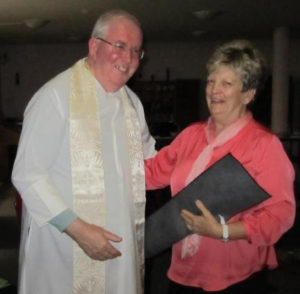
Fr Pat Munroe and Gwen Winterscheidt, Qld Director
The Marriage and Family Life Department of the Bishops Conference of England and Wales invited Fr. Peter McGrath in 2011 to pilot the movement in one parish within Dioceses that expressed an interest. As Chair of the Marriage and Family Life Commission, and Parish Priest of St. Wilfrid’s in Northwich at the time I sowed an idea that took root and flourished beyond my wildest dream.
Chris and Vince Joyce, co-ordinators of the Family Groups at St. Bernadette’s Church, Whitefield, Manchester, where the movement still flourishes spoke at the Masses one Sunday; their presentation made a deep impression on the people. They paved the way for the visit of Fr. Peter McGrath, whose style and humour was somewhat more extrovert. Much to my amazement 120 people ranging in age from 1-92 turned up one dull October Sunday evening in the Parish Centre, not sure what to expect, and in a short time were mingling and mixing with each other with the kind of ease that takes years to create.
Group leadership is crucial to the success of family groups, and we were fortunate in having six couples who agreed to take on the role. Six groups were created and were given the task of organising a simple social event to take place within a month for people to get to know each other.
Making a Difference
The first noticeable difference was that more people got to know each other by name and were more inclined to stay behind after Mass to speak with each other. Those who were retired or lived on their own had events to look forward to, and overall there was a greater sense of being a community. It was one of the most exciting and riskiest adventures I had taken on in parish ministry, and though I was moving on to a new assignment within three months, I did so with the conviction that once established they had the potential to grow and make a difference for good, whilst recognising that bringing people together is at once simple and complex.
A new landscape
What impressed me during my time in Australia was in the great number of people who shared their experience of being part of a family group over many years. One of the great plus factors is in giving them a greater sense of ownership for their parish community, especially at a time when an increasing number of parishes are being clustered, and a priest has responsibility for more than one parish. Family groups can be a bed rock for bringing parishes together and in turning a cross of grief into a cross of hope. In a changing landscape forming groups presents a bigger challenge but the message, ‘love one another as I have loved you’ and the need for belonging remains the same. This too is our reality, and as we know from experience, the biggest fear for people is the loss of the sense of community.
An Invitation
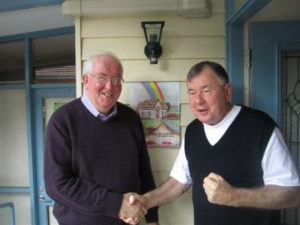
Fr Pat Munroe and Fr Peter McGrath at Grace Cottage
The Marriage and Family Commission of the Bishops’ Conference are in the process of producing a DVD on Family Groups as a support for parishes and Dioceses. You can watch an interview they did with me on U tube by simply inserting Fr. Pat Munroe into the ‘Google’ search engine. What first inspired me was watching the DVD ‘Matters of the Heart’ which can be seen on the Passionist Family Movement website: www.pfgm.org. Fr. Peter McGrath is intending to visit England in October and would be willing to meet with and encourage parishes seeking to do as Jesus ‘love one another as I have loved you. As chair of the Marriage and Family Life Commission I would love to hear from you.
Within each of us there is a Passionist heart in need of awakening.
Fr Pat Muroe
Family Groups in England and Wales, Chaplain.

